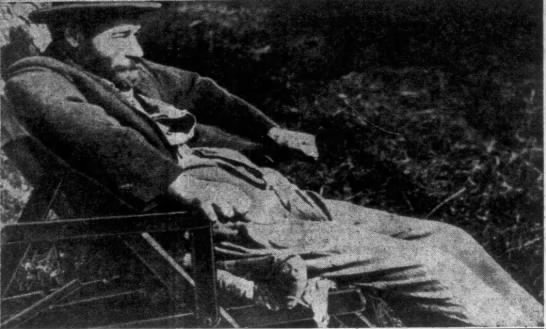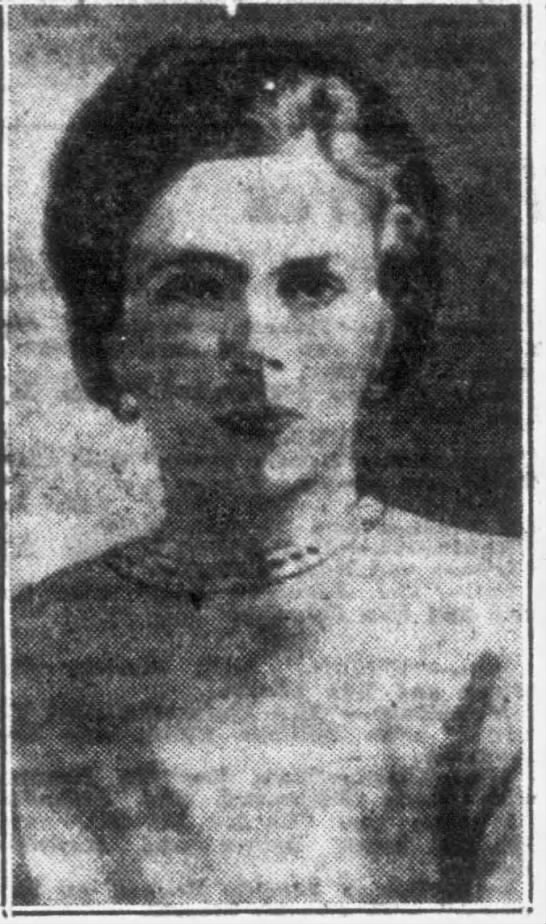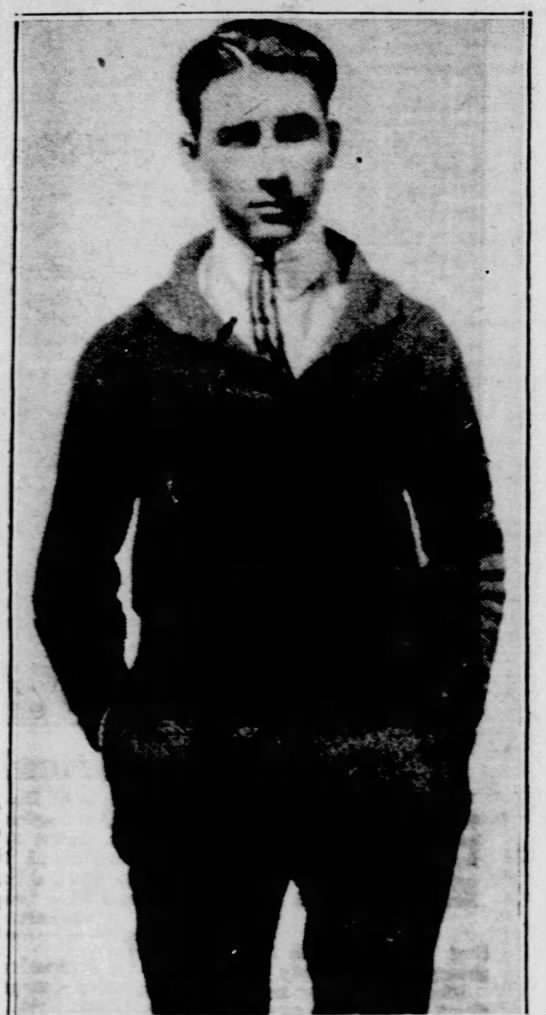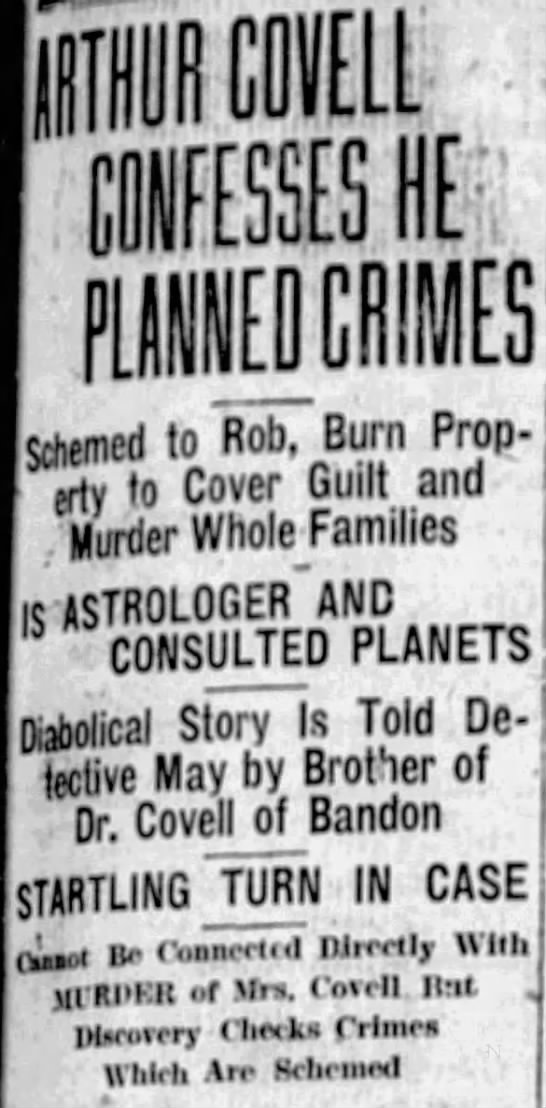 |
| Roseberg News-Review, September 7, 1923, via Newspapers.com |
People have differing opinions about astrology. To some, it is ridiculous quackery, of interest only to con artists and the gullible. Others see it as innocent amusement; not to be taken altogether seriously, perhaps, but still worth the trouble of checking your horoscope each day in the newspaper. To others, it is a serious science that, when practiced correctly, does not only reveal personality traits, but gives a road map to one's future life.
It's not every day that you come across someone who also saw it as a murder weapon.
Meet the family of Bandon, Oregon chiropractor Fred Covell and his fourth wife, Ebba (the first two Mrs. Covells died and the third did a runner.) Living with them were 16 year old Alton and 14 year old Lucille, Fred's children from his third marriage, and Fred's forty-seven year old brother Arthur. It could not be called a cheery family. Both Alton and Lucille were mentally disabled. In December 1920, Arthur's back had been broken in an auto accident, leaving his lower body permanently paralyzed. He seldom left his bedroom.
 |
| Knoxville Journal, January 18, 1948 |
Whatever one could say about Arthur Covell--and, as you will learn, one could say plenty--he was far from a stupid man. He had used his involuntary leisure time to teach himself astrology and the art of making horoscopes. He used this skill to build up a highly successful business in mail-order horoscopes and fortune-telling. (According to at least one report, his client list included Hollywood director William Desmond Taylor. If true, it would be interesting to know what Covell predicted for his future.) Arthur made an eerie spectacle to those unfamiliar with him. He had a long, gaunt body, with deep-set black eyes and long dark beard set against pale, corpselike skin. Seeing him lying in bed, with all of his astrological paraphernalia strewn around him and charts of the heavens plastered over the bedroom walls, put people in mind of a medieval sorcerer in his lair.
Relations between this suburban John Dee and his sister-in-law were not good. Arthur had an irritatingly sardonic, sneering way about him, and Ebba deeply resented his presence in the household. According to Lucille, Mrs. Covell even complained about the amount of food Arthur ate. The tension led to frequent quarrels between Ebba and her husband.
 |
| Ebba Covell, Knoxville Journal, January 18, 1948 |
In short, the Covell home was a strained one. However, nobody knew just how strained it was until September 3, 1923. Around mid-day, Arthur used the telephone extension by his bedside to call his brother's office. "You better get home here fast," he told Fred. "The brats [Arthur's charming way of referring to his niece and nephew] tell me there's something wrong with Ebba."
This was quite the understatement. When Fred arrived home, he found his wife's corpse lying on her bed. When he asked his son for an explanation, Alton replied, "Dunno. I found her lying on the floor in the hall by the telephone when I came in from the barn."
"What's the matter with her, Pop?" asked Lucille.
"She's dead," Fred replied.
When Fred went to his brother's room to tell him the tragic news, he found that Arthur was completely unsurprised. "She's dead, ain't she, Fred?" said Arthur mockingly. "The kids wouldn't tell me. But the stars did. They always tell. Jupiter and Mars are adverse to the sun and Venus. That's a juxtaposition Ebba couldn't take."
When the police arrived, they soon came to a far more earthly conclusion about what had killed Ebba. They noted that Ebba's face was oddly mottled, with red marks running from her mouth and nostrils. They noted a bruise on her forehead. They noted that Fred was showing a curious haste to have his wife buried. They noted that Fred himself signed Ebba's death certificate, stating, "natural causes." They noted that Fred's alibi--that he had been at his office all day--could not be corroborated by anyone. In fact, Arthur told them that when he first called Fred's office, his brother was not there.
Law enforcement began to smell a husbandly rat. They got a judge to delay Ebba's burial, pending further investigation.
When police interviewed Ebba's nearest and dearest, they got precisely nowhere. Fred was listless and sullen. Alton and Lucille were equally uncommunicative. Arthur--who seemed to be getting an intense private amusement from the situation--did nothing but chatter about how the stars did Ebba in.
 |
| Alton Covell, New York Daily News, January 18, 1948 |
The post-mortem raised further suspicions. It found that Ebba's neck was dislocated, but not enough to have caused her death. There were bruises around her neck, but no evidence of actual strangulation. It was a mystery what caused the strange red, burn-like marks on her face. The coroner could not determine just what had killed Mrs. Covell, but he was certain it "wasn't natural." The inquest jury returned a verdict that Ebba died at the "hands of a person or persons unknown."
The police had a far easier time coming up with a suspect, by a simple process of elimination. It was obvious that Ebba had been killed--by whatever means--by someone in her family. It was impossible for the paralyzed Arthur to have done the deed. Alton and Lucille, detectives reasoned, were not mentally capable of carrying out what was obviously a sophisticated crime. That left only one person. Within an hour of the inquest's conclusion, a warrant was issued charging Fred Covell with the murder of his wife. Both he and Arthur were lodged in the county jail, while Alton and Lucille were sent to the county farm. (It was felt necessary to keep Fred's relatives in custody as material witnesses.) A second, more thorough, autopsy was done on Ebba, which finally revealed how she died. A cloth soaked in ammonia had been pressed against her mouth and nose, suffocating her. It was a diabolically clever method--if it had not been for the ammonia leaving those burn marks on her face, the authorities would never have been able to determine the cause of death, making a murder investigation nearly impossible.
Although detectives were certain that Fred was responsible for Ebba's death, they realized there was a discouraging lack of evidence to prove it. In the hopes of strengthening their case, a search was done of Fred's office and the Covell home. They indeed found the proof they were seeking, but it took them in another direction altogether--and it was the most bizarre and unexpected direction imaginable.
In Arthur's bedroom, they found a memorandum book, full of notations in the astrologer's handwriting. They were all in code, but in a simple one that was easily deciphered. Detectives were stunned when they realized what they were seeing. One entry read, "The moon in the house of trine Uranus. Ought to get $5,000 from Corson [a wealthy local citizen] for Wi and Peg back. Sign note K.K.K." Another referred to plans to have the family of a rich dairyman named E.J. Pressy die in a house fire, but "not before you take the doors and windows out of it to be used in my new house." Merchant Ira S. Sidwell was to "fall down stairs at store. Will have will and other papers in pocket." On every page, Arthur recorded plans to assassinate twenty-seven of Bandon's most prominent residents--automobile crashes, drownings, poisonings, every murder method in the book, and a few the book never even contemplated. He made careful calculations for the most propitious dates and times for these exterminations. It was an astrological diary of death. Investigators also found a stack of wills Arthur had forged, where his planned victims were described as leaving him or his agents all their worldly goods.
The date of Ebba Covell's demise was found over and over in the little book, with notations figuring out the most advantageous time of day for her murder. Near the end was an entry reading "6:20 a.m. Sept 3, Monday. Will Al do his part?" A subsequent entry: "Sept 3. Eleven a.m. Should have been 11:14."
When investigators confronted Arthur, he smirked. He was quite proud of his handiwork. "Heh, heh!" he chortled. "Found it, eh? Thought you'd want to know about it. Stars said you would." When asked what he meant by these sinister notations, Arthur replied contemptuously, "I wished things to happen to people. Got any law against wishing?"
The interview with Arthur left detectives angry and frustrated. It was clear he knew exactly what had happened to Ebba, but any attempts to get him to confess just brought on more astrological babblings. Police turned to Alton, who, they felt certain, was the "Al" Arthur hoped would "do his part." When questioned about the book, the boy almost instantly crumbled. "I did it for Uncle Arthur," he sobbed. "He made me and Lucille do anything he wanted. Bad things always seemed right when he talked to us. When he said do it we just did anything because it seemed the thing to do."
Alton readily provided a formal written statement. It said:
Uncle Arthur told me to buy a 10-cent bottle of ammonia. Then he told me we'd have to kill Ebba because she had learned something he wanted to do and she was going to tell Fred. It was something that would make us all rich and she would spoil his plans.
So, she was standing by the telephone when I came in. I put the cloth on her face and held her arms with my left arm around her. It took a long time. I don't know how long. I called Lucille and we got Ebba up on her bed. She was all limp and dead. Lucille threw the bottle down the gully. My uncle told her to. He told us what to say to Dad and the police, so we did. He said he would have a lot more work for me--kidnapping, setting fires, pushing people downstairs. All exciting.
When asked about all this, Lucille confirmed every detail of Alton's story. The teens felt a supernatural awe of their uncanny uncle. They were convinced he was a genuine wizard, and they did not dare contradict or defy him in any way. Even if it meant killing their stepmother and a sizable percentage of their neighbors.
When Arthur was informed that his niece and nephew had grassed on him, he scornfully told all. "The brats are telling the truth," he said scornfully. "I'd have been master of this county after Alton had killed a few good-for-nothings around here if I'd obeyed the stars. Shouldn't ever have worked up Ebba's horoscope on a day when the heavens were unfriendly to me. Made a simple mistake. Figured the wrong day and hour."
Arthur's sole regret was that he had mis-timed his sister-in-law's murder by fourteen minutes.
 |
| Coos Bay Times, October 9, 1923 |
Covell's murder trial began on November 5, 1924. Although his lawyers made vigorous efforts to save their client's quite worthless neck, the fact that all three participants in the murder had freely and fully confessed was a handicap Perry Mason couldn't have overcome. The star witness was Lucille Covell, who calmly explained in great detail how her uncle had enlisted Alton as his hit man. She giggled throughout her whole testimony, as if the whole matter was an excellent joke. The jury needed little time to deliver a verdict of guilty. Murder in the first degree, with a pointed lack of recommendation for mercy. On May 22, 1925, this strangest of would-be serial killers--with his final self-cast horoscope stuffed in the waistband of his pants--was brought to the gallows in a wheelchair and hanged. It was a particularly grim business. Arthur was so thin and frail, he was too lightweight for the noose to break his neck. For a full twenty-six minutes, his paralyzed body slowly strangled to death.
A horrible end, but arguably no worse than what he had planned for a great many innocent people.
 |
| New York Daily News, January 25, 1931 |
A few days after the end of Arthur's tribunal, Alton was tried on the same charges. He too was convicted, although the jury in his case recommended mercy. He was given a life term at the state penitentiary. In October 1932, he was released on a conditional pardon. Alton, so far as is known, led an uneventful life from then on until he died in Texas in 2002. Lucille was never tried, and her subsequent history is unknown.
After his execution, Arthur was cremated. As no one claimed his ashes, they are still stored at the Oregon State Hospital, a suitably macabre relic of one of history's most occult murder cases.
A truly despicable man, Arthur Covell, not only for the murder he instigated - which probably had no point except in his head - but for using his nephew and niece to accomplish it. And no remorse for any of it. It makes one favour the death penalty, at least in this case.
ReplyDelete